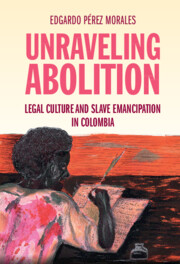Acknowledgments
This book began as my doctoral dissertation in history at the University of Michigan, co-advised by Rebecca J. Scott and Richard L. Turits. Long after my dissertation defense was over, their insight, guidance, and support remained crucial to this work. Along with Julius S. Scott, Jean M. Hébrard, Susan Juster, and Javier Sanjinés, Rebecca and Richard deserve much credit for the shaping of this book. I extend my warmest thanks to them for their lessons and hope they will forgive any errors or roughness in the final product, which are my own.
Unraveling Abolition was developed in dialogue and collaboration with the help of many dear Colombian colleagues. At Universidad Externado de Colombia (Bogotá), Daniel Gutiérrez Ardila, whose scholarly work has advanced the historiography of revolutionary Colombia by leaps and bounds, deserves special thanks. Over the last decade, Daniel has been generous in sharing both his knowledge and his home with me, providing many of the documents, references, and ideas found in these pages. At Universidad Nacional de Colombia (Medellín), Roberto Luis Jaramillo remains an exceptional mentor and friend – his recognized authority on matters of Colombian history and legal culture, ranging from the intricacies of Spanish medieval legacies to the choppy waters of genealogy and the secrets of our fractured geography, has been invaluable. Also at La Nacional, Orián Jiménez Meneses and Juan David Montoya Guzmán have been constant allies, helping me track down documents, test ideas, and consider the deep colonial roots of revolutionary and republican polities. Finally, it was Oscar Almario García who first pointed me in the direction of the Colombian Pacific and the old lands of Popayán, providing early and crucial insight for this project. At Universidad de Antioquia (Medellín), Juan Sebastián Gómez González has extended a cordial welcome every time I visit. His nudge in the right direction has helped me not only to make meaningful connections in my work, but also to widen my scope to consider histories and fictions from far and wide. At Western Michigan University (Kalamazoo), I am grateful to Ángela Pérez Villa whose work continues to pose exciting questions that are always reminding me why we must strive to bridge historiographies. For well over a decade now, Armando Martínez Garnica, at Universidad Industrial de Santander (Bucaramanga), has been gracious in sharing his understanding of Colombian history, and has opened both his house and his archives to me a number of times; the depth of his knowledge is only rivaled by the extent of his generosity.
In Colombia, Cuba, Ecuador, France, Spain, Germany, and the United States, I would like to thank Paulina Alberto, Ernesto Bassi, Guillermo Bustos, Sueann Caulfield, María Eugenia Chaves Maldonado, Adriana Chira, Luis Miguel Córdoba Ochoa, Marcela Echeverri, Ada Ferrer, Sybille Fischer, Rebecca Goetz, Max Hering Torres, Jesse Hoffnung-Garskof, Marial Iglesias Utset, Peter Linebaugh, Peter Mancall, Graham Nessler, Francisco Ortega, Nathan Perl-Rosenthal, Jean-Frédérique Schaub, Sinclair Thomson, Isidro Vanegas, Barbara Weinstein, and Michael Zeuske. Special thanks also to Juliana Álvarez Olivares and Antoine Vilotte in Paris. In New England, New York, the Great Lakes, and Cascadia, further thanks must go to Ben Cronin, Valentine Edgar, Ryan Gordon, Naomi Kirk-Lawlor, Michael Leese, Kate Rosenblatt, Anthony Ross, Eric Schewe, David Schlitt, Shelley Selim, Amy Warhaft, and Sarah Zarrow; and in Alta California, to Richard Antaramian, Jason Glenn, Josh Goldstein, Wolf Gruner, Paul Lerner, Maya Maskarinec, Ketaki Pant, as well as to the Ellita Place crew: Stephanie Candelaria, Zoa López, Alex Nuño and all the rest.
I am grateful for the patient and meticulous work of Cambridge University Press and the Studies in Legal History series, especially that of Holly Brewer, Cecelia Cancellaro, Sarah Barringer Gordon, and the editorial staff. I would also like to thank Matthew Mirow and a second anonymous reviewer for their evaluations and helpful feedback.
Finally, a heartfelt thanks and much love to both my families in Antioquia and Michigan, especially to Carly who has remained patient and supportive throughout this unwieldy project, and has done the most to help me unlock the secrets of writing in English.

